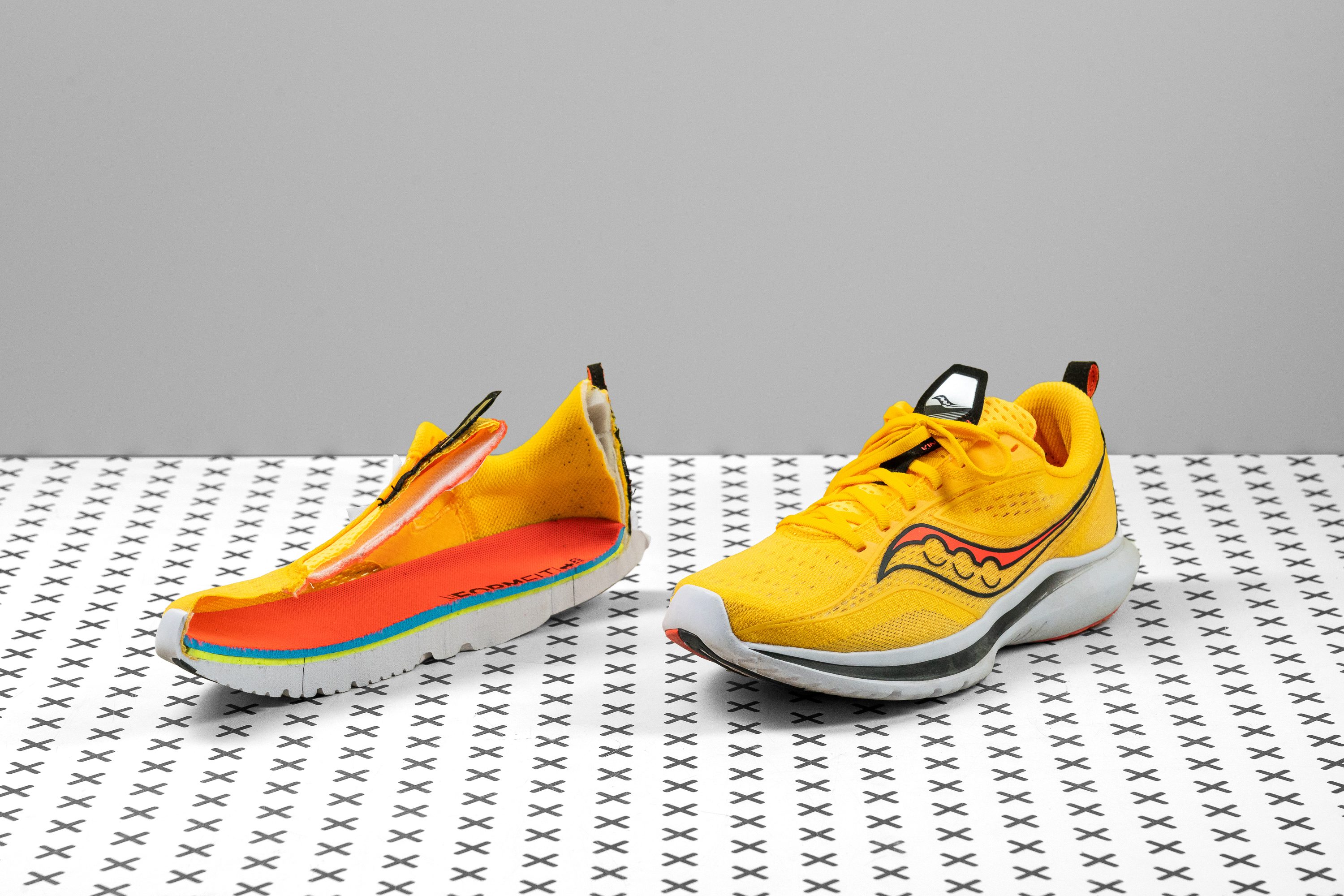Our verdict
- Top pick in best low drop running shoes (2024)
Pros
- Soft and responsive cushion
- Insanely light
- Secure lockdown
- Tongue stays in place
- No lace bites
- Breathable for warm weather
- Reflective elements
- Sustainably-made upper
Cons
- Lacks cushion for long runs
- Too roomy for narrow feet
Audience verdict
- Top 28% in road running shoes
- Top 25% in Saucony running shoes
Comparison
The most similar running shoes compared
+ + Add a shoe | |||||
|---|---|---|---|---|---|
| Audience score | 89 Great! | 88 Great! | 88 Great! | 84 Good! | |
| Price | £125 | £125 | £120 | £135 | |
| Pace | Tempo | CompetitionTempo | Daily runningTempo | Daily runningTempo | |
| Shock absorption | - | - | Low | Moderate | |
| Energy return | - | - | Low | Low | |
| Traction | - | - | High | High | |
| Arch support | Neutral | Neutral | Neutral | Neutral | |
| Weight lab Weight brand | 7.2 oz / 204g 7.2 oz / 204g | 7.9 oz / 224g 7.9 oz / 224g | 7.3 oz / 207g 7 oz / 198g | 7.7 oz / 217g 7.6 oz / 215g | |
| Lightweight | ✓ | ✓ | ✓ | ✓ | |
| Drop lab Drop brand | 4.5 mm 4.0 mm | 1.1 mm 0.0 mm | 4.5 mm 4.0 mm | 5.9 mm 5.0 mm | |
| Strike pattern | Mid/forefoot | Mid/forefoot | Mid/forefoot | Mid/forefoot | |
| Size | Slightly small | True to size | - | Half size small | |
| Midsole softness | Balanced | Balanced | Balanced | Soft | |
| Difference in midsole softness in cold | Normal | Normal | Small | Small | |
| Toebox durability | - | Good | Bad | Bad | |
| Heel padding durability | - | Decent | Good | Good | |
| Outsole durability | - | Good | Bad | Decent | |
| Breathability | - | Breathable | Breathable | Breathable | |
| Width / fit | Narrow | Wide | Medium | Wide | |
| Toebox width | - | Wide | Narrow | Wide | |
| Stiffness | Moderate | Moderate | Moderate | Moderate | |
| Torsional rigidity | Flexible | Flexible | Moderate | Stiff | |
| Heel counter stiffness | Moderate | Flexible | Moderate | Moderate | |
| Heel lab Heel brand | 26.9 mm 28.5 mm | 22.5 mm 24.0 mm | 28.0 mm 29.0 mm | 32.8 mm 34.5 mm | |
| Forefoot lab Forefoot brand | 22.4 mm 24.5 mm | 21.4 mm 24.0 mm | 23.5 mm 25.0 mm | 26.9 mm 29.5 mm | |
| Widths available | NormalWide | Normal | Normal | Normal | |
| Orthotic friendly | ✓ | ✓ | ✓ | ✓ | |
| Season | - | SummerAll seasons | SummerAll seasons | SummerAll seasons | |
| Removable insole | ✓ | ✓ | ✓ | ✓ | |
| Ranking | #176 Top 26% | #144 Top 38% | #126 Top 33% | #255 Bottom 33% | |
| Popularity | #488 Bottom 28% | #242 Bottom 36% | #183 Top 48% | #134 Top 35% |
Size and fit
Size
Saucony Kinvara 13 fits slightly small (142 votes).
Who should buy the Saucony Kinvara 13
The Kinvara 13 from Saucony is a must-have for:
- beginners who want a moderately-priced uptempo shoe
- Kinvara fans who want a lighter, more responsive version of the Kinvara 12
- runners who want a stable, more minimal running shoe
- those who want a springy ride for short to mid-distance training runs
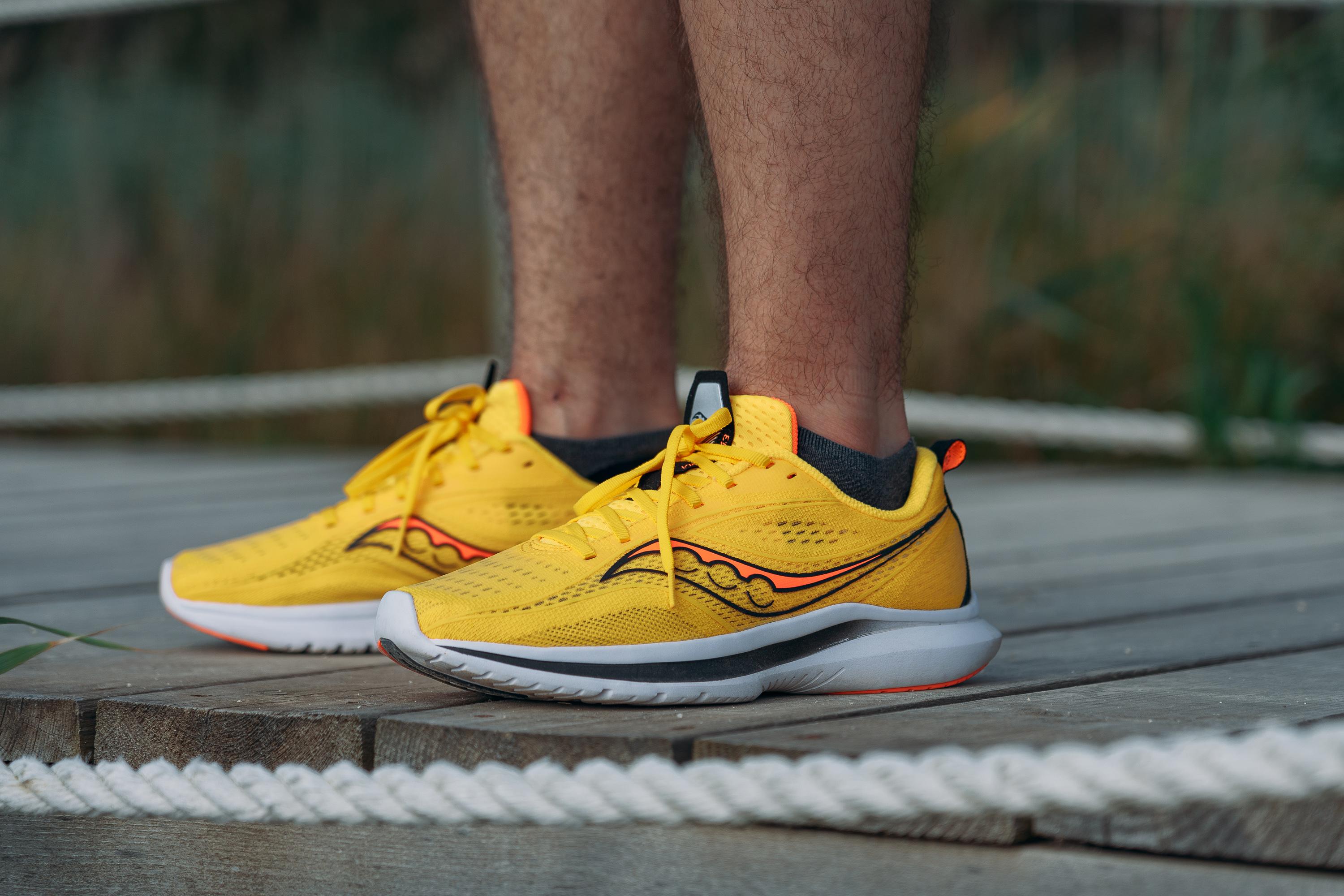
Who should NOT buy it
It's a pass if you prefer more stack or something that's more suitable for high-mileage runs.
We measured the heel stack height (insole included) at 26.9 mm which is lower than the average 33 mm among our lab-tested shoes.

For a more cushioned ride, take the Saucony Endorphin Speed 2. And for longer distances, we think you should go for the NB FuelCell Rebel v2. If you're looking for an easy-day trainer, the Saucony Endorphin Shift 2 is a no-brainer.
Kinvara 13 vs. 12: Nothing major
There's not a lot of change implemented on the thirteenth edition of the Kinvara. However, it remains proof that the smallest change makes the biggest impact.
Here are the updates that made the Kinvara 13 go from firm to fun:
- Smoother and more responsive ride: Thanks to a more bevelled midsole and a contoured design, heel-to-toe transitions are more seamless.
- Lighter: It goes from 7.5 oz or 213 g (in US M 9) to 7.2 oz or 204 g because of its trimmed-down upper.
- Softer upper with better support: A new mono mesh upper is introduced with a more pliable feel. Despite being stretchy, it remains secure because of its overlays and gusseted tongue.

Lightest Kinvara yet
The Kinvara 13 from Saucony goes on a diet with its 6.8 oz (192 g) weight in a men's US 9. This is lighter than all of the previous Kinvara iterations! And contrary to the average of tempo running shoes (8.9 oz), it doesn't tip the scales.
This is indeed one of the lightest running shoes you can get.
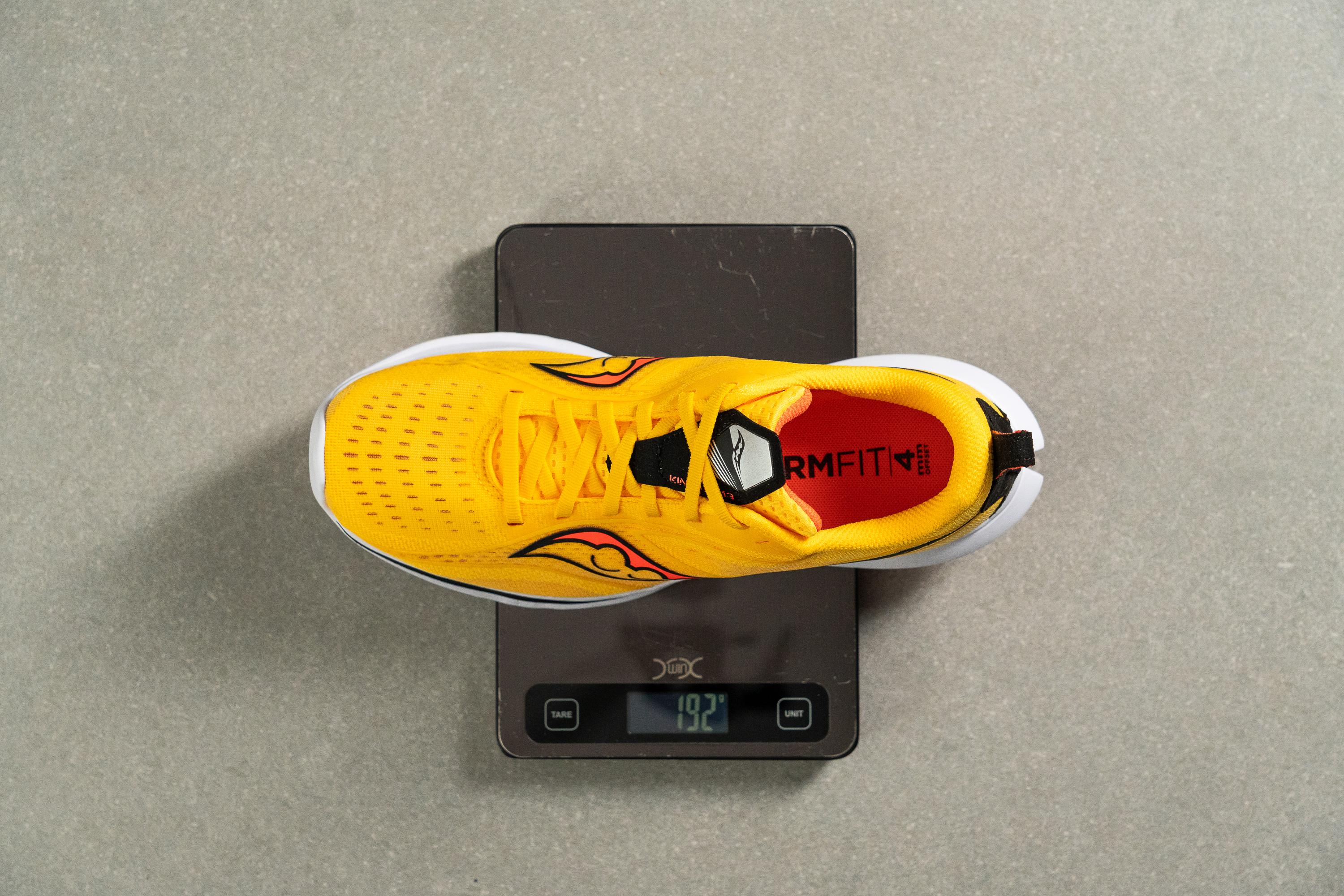
Brings back the fun
The Kinvara 12 was more of a miss because of its rather rigid ride. But with the Kinvara 13 turned out to be more forgiving and bouncier in our run tests!
Based on our durometer measurements, at 21.5 HA, the foam turns out to be 11% softer than the average of road running shoes.
Keep in mind though that the cushioning loses its softness in colder conditions. This means that it might take some time for the shoe to "warm up."
We have put the shoe through our freezer test (20 minutes in the freezer), measuring the softness before and after. The foam got 23.9% firmer.
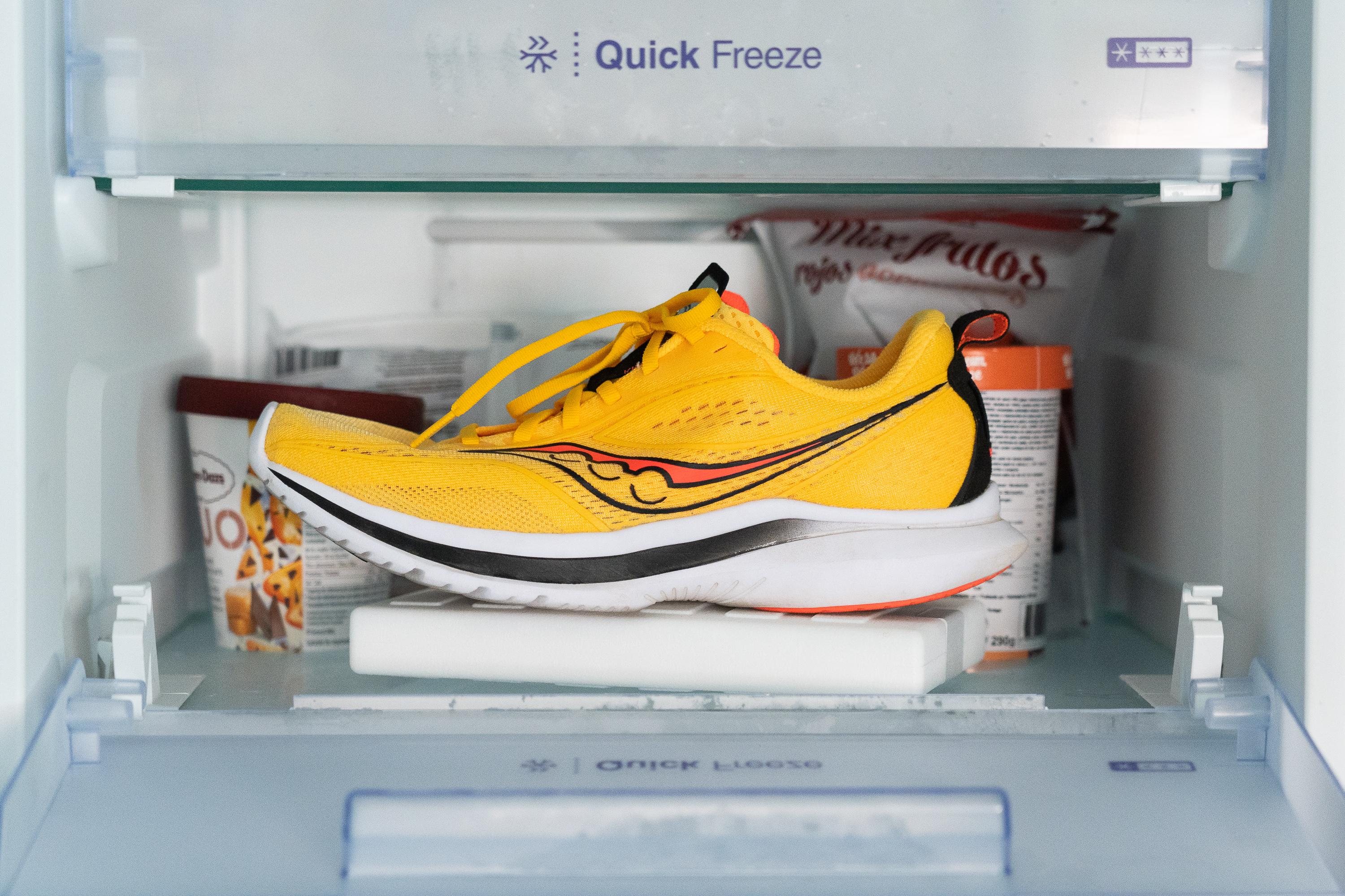
The Kinvara 13 is super flexible
Being nearly a minimalist running shoe, the Kinvara is not only close to the ground but is also highly flexible and manoeuvrable.
The shoe's flexibility is way above the average. It takes only 13.8N to bend the shoe to a 90-degree angle which is 120% less than it takes running shoes on average! It also bends easily in any direction.
However, if you intend to use the shoe in colder temperatures, it is important to point out that it gets insanely stiffer!
After our freezer test, the shoe's flexibility changed by 148.3%! This is a significant outlier given that most shoes only stiffen up by 30-60%.
Width is average but wider than previous Kinvaras
The Kinvara 13 appears to be slightly roomier than the previous iterations. Our medium-width feet experienced no toe bumps or toe pressure in this Saucony shoe.
However, we wouldn't put the shoe into the "wide toebox" category given that its forefoot width is 95.9 mm, which is a little narrower than average.
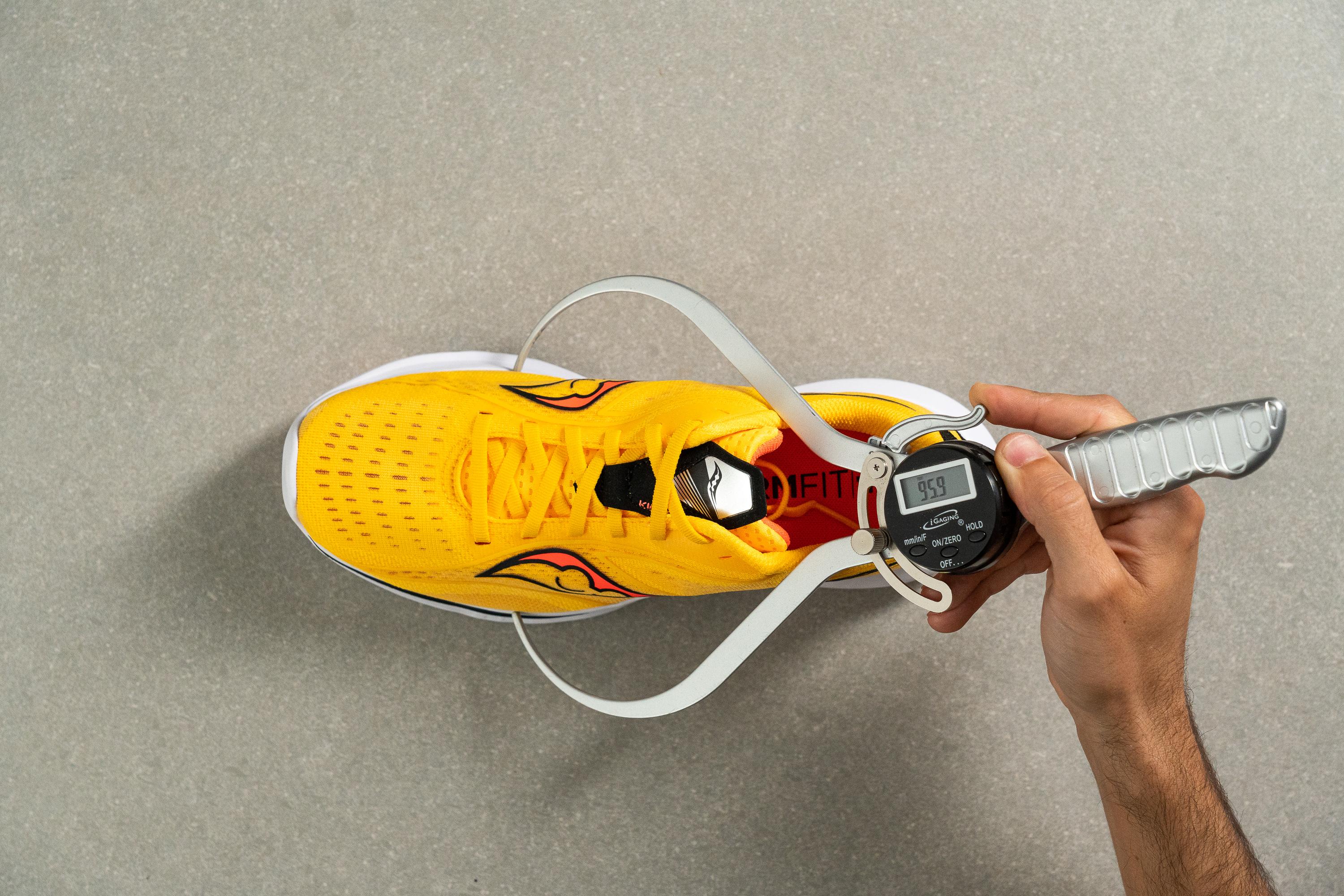
The Kinvara 13 keeps you supported
We really appreciated the shoe's racer-like fit, especially during sharp turns and fast efforts. There were no slips or missteps in the Kinvara.
The mono mesh upper is stretchy but not in any way sloppy. It follows the shape of the foot so well and has sufficient padding in all the right places; it's snug from the rearfoot to the midfoot.
The Kinvara 13's tongue understands the assignment
It's gusseted, reflective, padded, and has a pull tab - what else could you wish from a running shoe tongue? It also stays in place and does a great job of preventing lace bites.
It is 5.0 mm thick which is quite noticeable. For reference, on the Saucony Ride 15 daily trainer it's even thinner (4.2 mm).
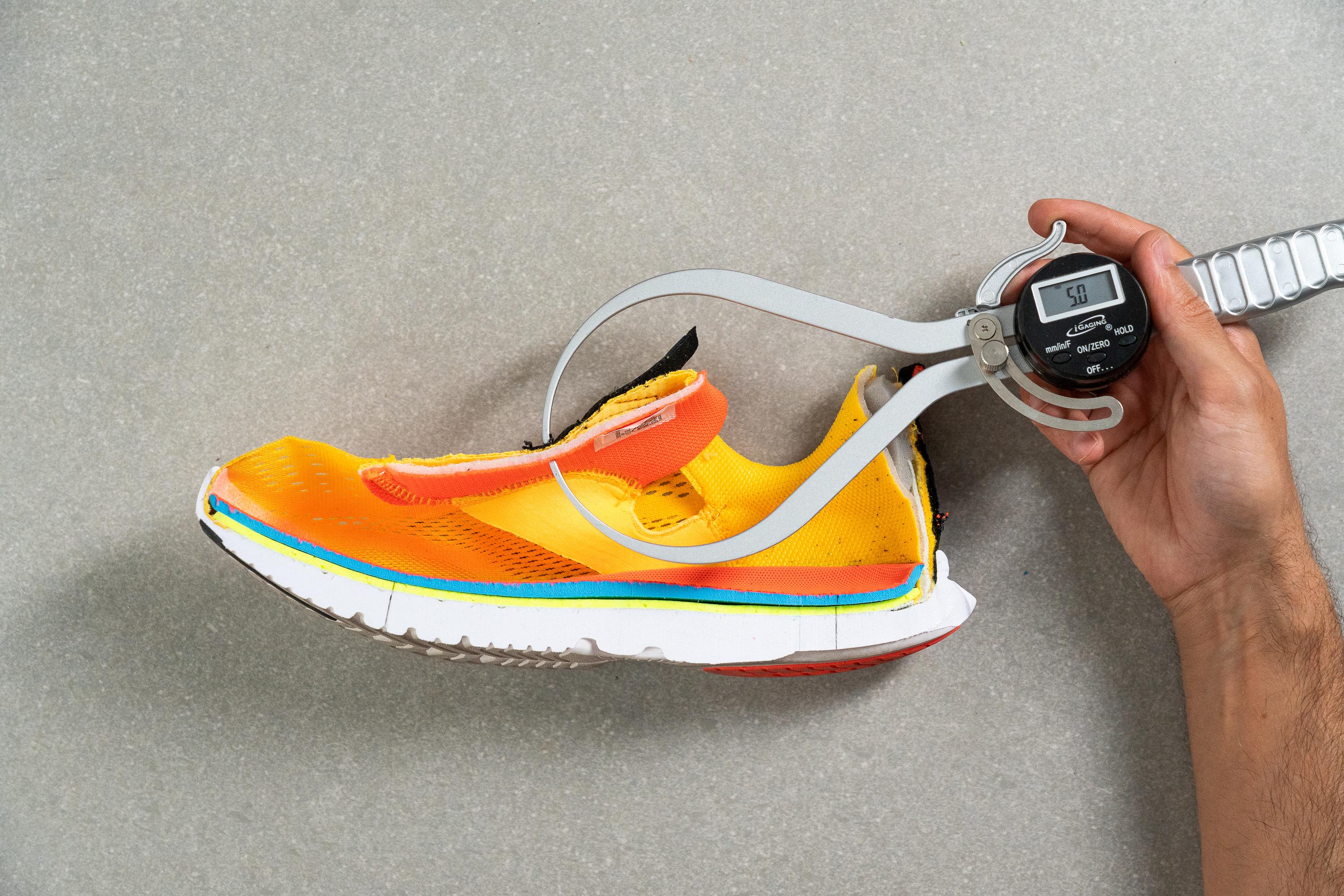
No more sweaty feet
The Kinvara 13 from Saucony is superbly breathable. Testing the shoe in warm conditions was literally a breeze and we found that the upper doesn't absorb moisture.
In our transparency test below, we lighted the mesh from the inside to show you how easily the light passes through the material.
Not a hard-wearing shoe
As there is no full-length rubber protection on the outsole, the Kinvara 13 is not really geared towards durability. It has two rubber components in the forefoot and the heel, where grip and protection are most needed but the long-term shelf life of the shoe remains a question.
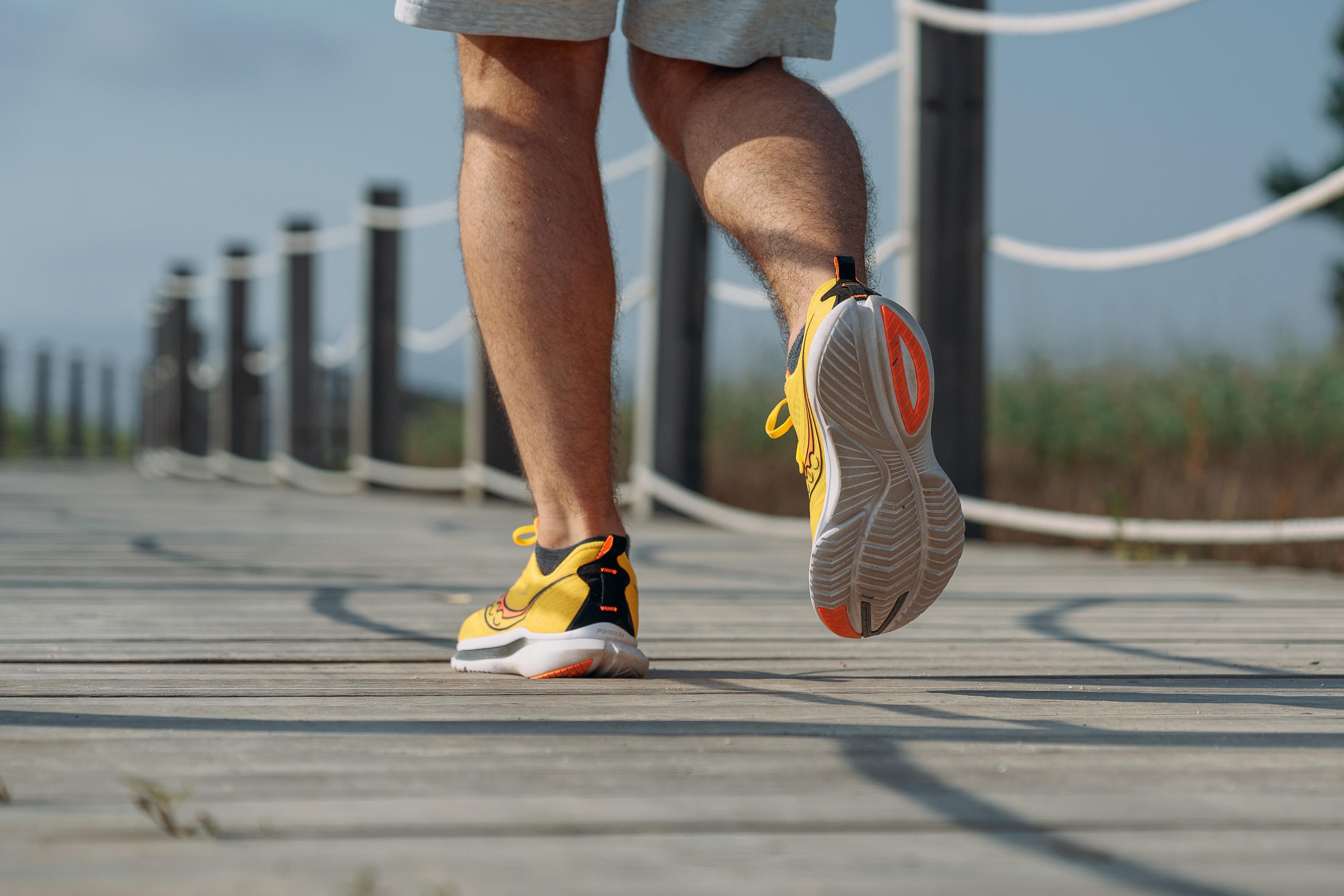
Measured the rubber firmness at the bottom, we can see that it is also softer than average: 76 HC compared to 80 HC.
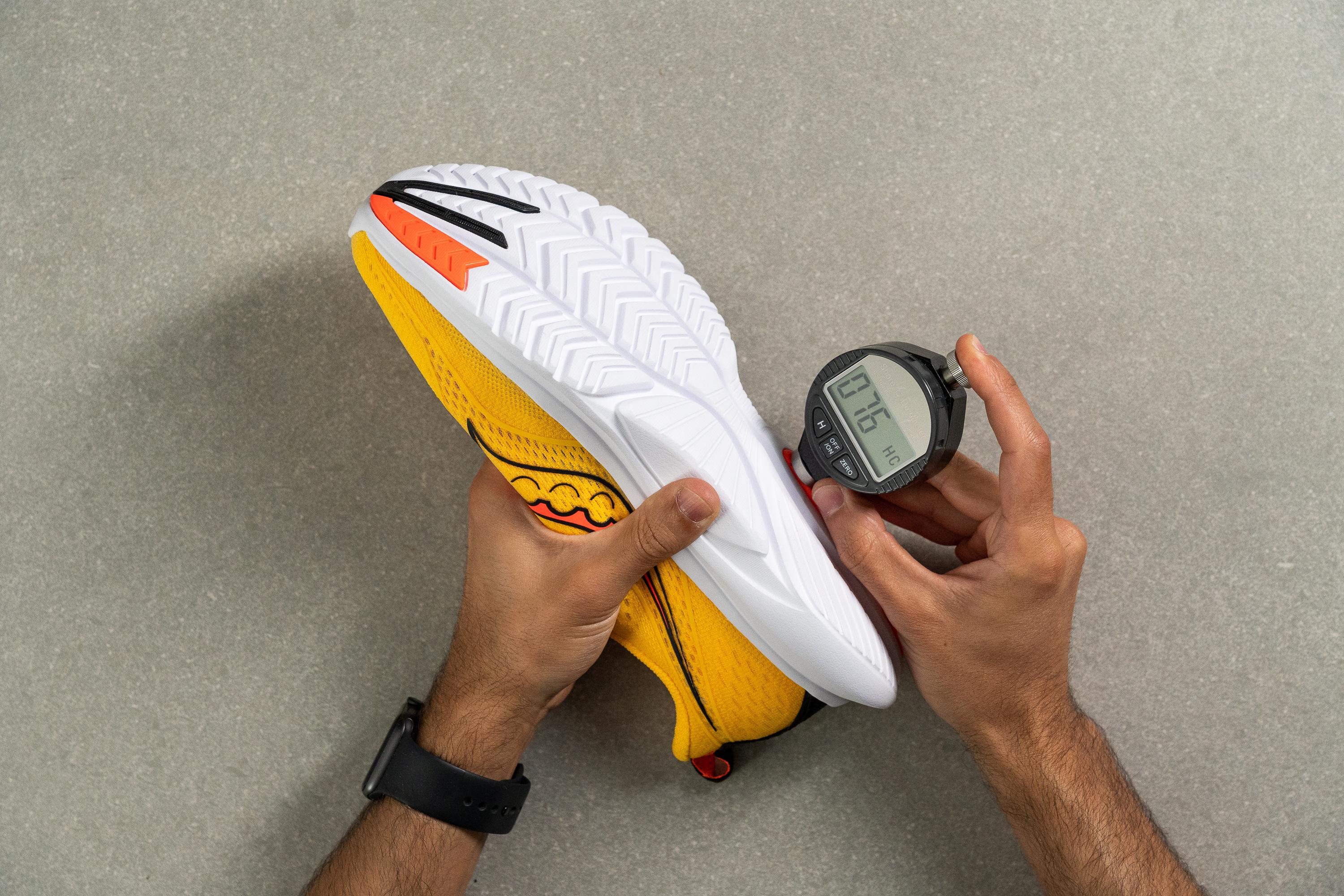
Big on comfort, small on waste
It's the first Kinvara to have a 100% recycled mono mesh upper, while the remaining components of the upper are made with 90% recycled materials.
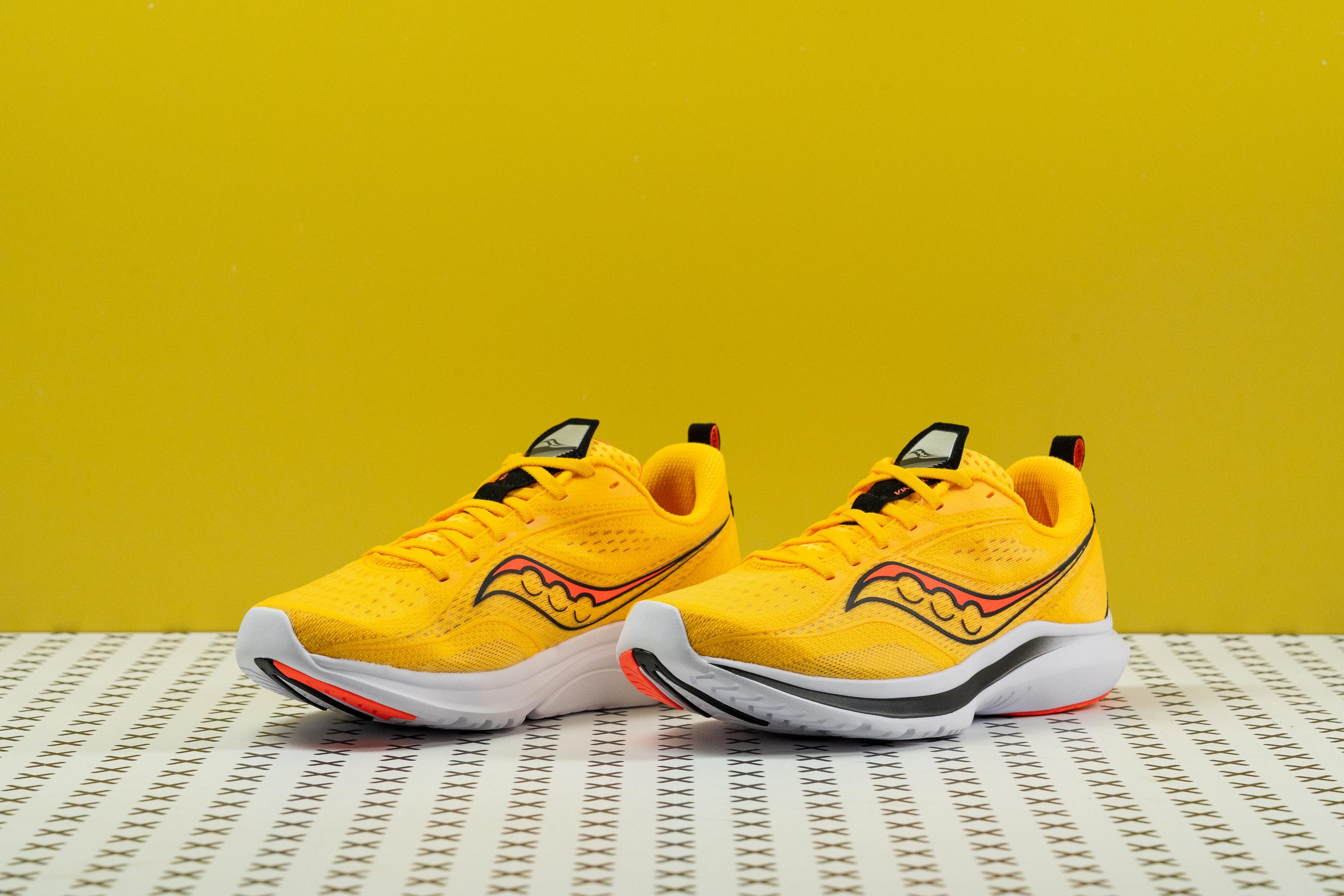
Not only does it care of the feet, it also takes care of the planet!

